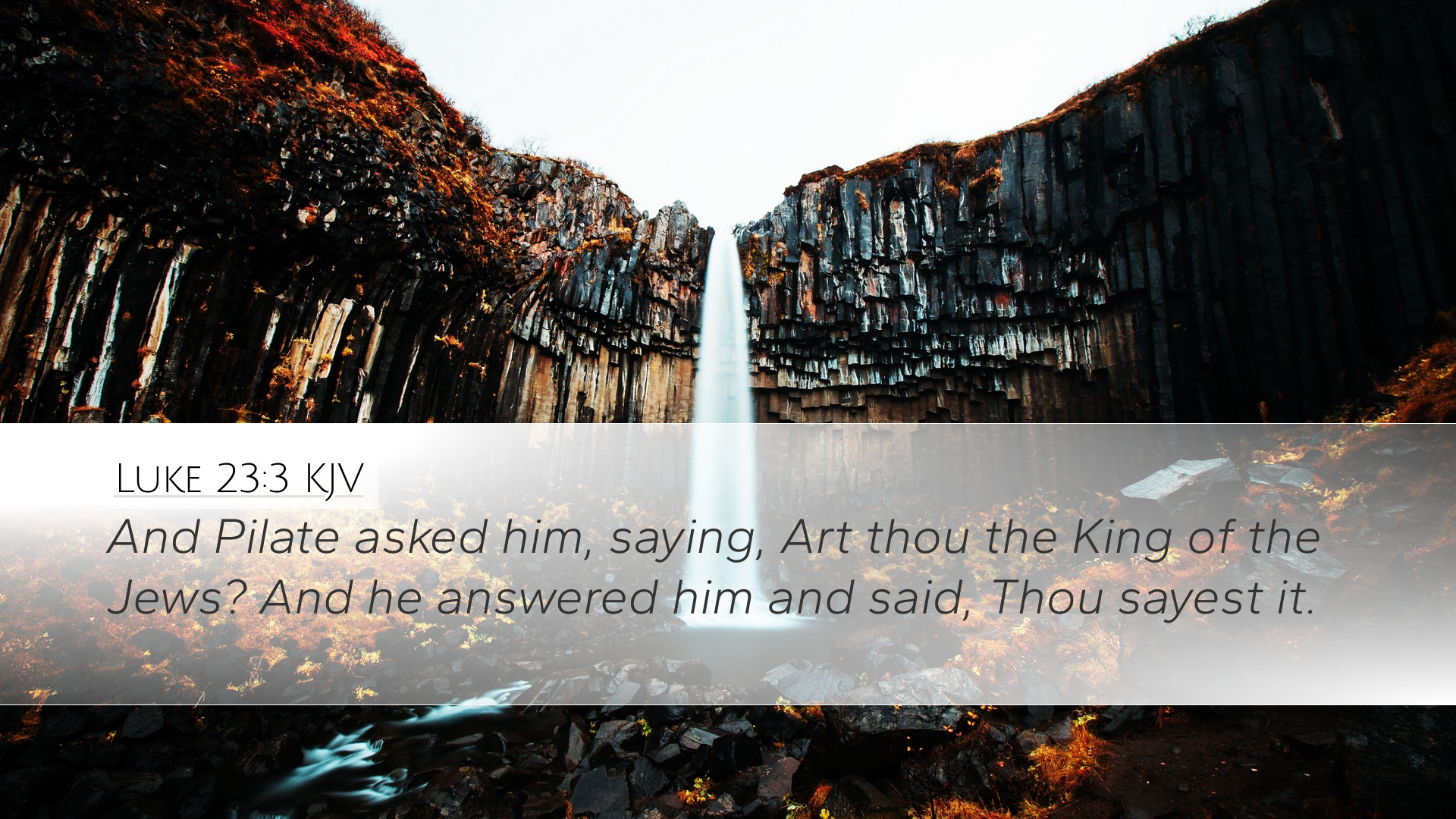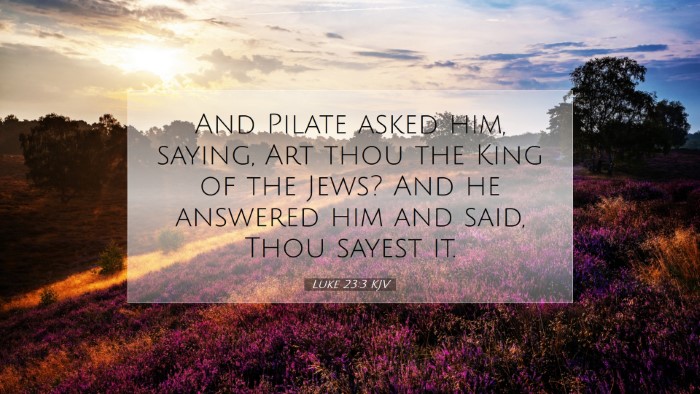Commentary on Luke 23:3
Luke 23:3 states: "And Pilate asked him, saying, Art thou the King of the Jews? And he answered him and said, Thou sayest it." This verse encapsulates the crucial moment of Jesus' trial before Pontius Pilate, highlighting both the gravity and the profound implications of the claims made about Jesus' identity.
Contextual Background
This passage occurs during the final hours of Jesus’ earthly ministry, where after being seized by the religious leaders, He was brought to Pontius Pilate, the Roman governor. The inquiry about Jesus being the King of the Jews is significant as it raises issues regarding messianic claims, political authority, and the nature of Jesus’ kingship.
Insights from Matthew Henry
Matthew Henry emphasizes the conflict between earthly authority and divine truth. He notes that Pilate's question reflects not only curiosity but a deeper political concern regarding who posed a potential threat to Roman rule.
- Political Tension: Henry explains that Pilate, representing Roman power, needed to discern whether Jesus was a revolutionary claiming authority that challenged Roman supremacy.
- Truth in Response: Jesus’ response, "Thou sayest it," is interpreted as an acknowledgment of His identity, albeit in a way that transcends Pilate's expectations of kingship. Henry points out that the nature of Jesus’ kingship is spiritual rather than political.
Insights from Albert Barnes
Albert Barnes provides a theological lens on this moment, suggesting that this interchange illustrates Jesus’ awareness of His mission while also showing His humility in acceptance of the title "King of the Jews".
- Recognition of Kingship: Barnes asserts that by affirming His royalty, Jesus signifies the fulfillment of the Old Testament prophecies concerning the Messiah.
- Silent Strength: He notes that Jesus does not present an argument or defense. Instead, His quiet confidence and composure in the face of accusation serve as a powerful testament to His character and purpose.
Insights from Adam Clarke
Adam Clarke takes a more exegetical approach, focusing on the implications of Jesus’ response for understanding His nature as king and His mission on earth.
- Messianic Implications: Clarke highlights that the title "King of the Jews" holds profound implications. Jesus redefines what it means to be king—His kingdom is not of this world (see John 18:36).
- Humanity's Rejection: Clarke suggests that Pilate's inquiry reflects humanity's struggle with the authority of Christ. The challenge lies in the acceptance of a king who governs through love and servanthood rather than through coercion or violence.
Theological Reflections
The interaction between Pilate and Jesus in this verse calls forth vital theological considerations:
- Nature of Christ's Kingship: The acknowledgment of Jesus as King indicates a reality that transcends earthly kingdoms. His reign is characterized by grace and redemption, contrasting with worldly power.
- Human Authority vs. Divine Truth: The trial before Pilate showcases the tension between human authority and the divine truth that Jesus embodies. Pilate represents a temporary authority that ultimately yields to the eternal truth of Christ’s kingship.
Practical Applications
This verse compels modern readers, including pastors and theologians, to reflect on their own understanding of Christ's authority:
- Submissive Leadership: For leaders within the church, this passage serves as a reminder of the model of leadership that Christ exemplifies—one rooted in servitude and sacrifice, rather than in domination.
- Understanding our Identity in Christ: Believers are called to recognize their identity as part of Christ's Kingdom. Their lives should reflect the values of that Kingdom, which is marked by love, justice, and humility.
- Witnessing to Authority: In a world that often challenges Christian values, this passage encourages believers to be bold in affirming Jesus’ lordship in their lives and communities.
Conclusion
Luke 23:3 presents a pivotal moment in the narrative of Christ's suffering and triumph. It lays bare the conflict between worldly authority and the transcendent nature of Jesus’ kingship. The insights from Matthew Henry, Albert Barnes, and Adam Clarke deepen our understanding of this passage, providing a rich tapestry of theological and practical reflections that continue to resonate with the church today.


